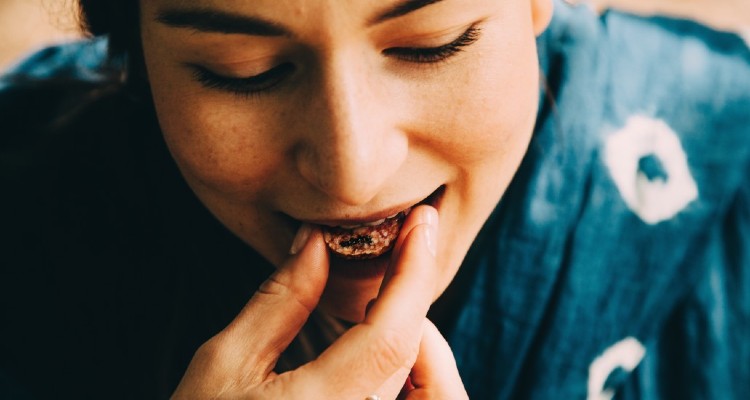
Excessive sugar consumption is a pervasive issue in North America.
In 2018, the average American consumed just over 126 grams of sugar per day, which is almost 30 teaspoons.[1] To put that into perspective, the official recommendation is that men should not exceed nine grams, and women should not exceed six grams of sugar daily. There is a shocking gap between the recommended and actual consumption of added sugars in a Standard American Diet (SAD).
Although our brains run on glucose, refined sugar is an anti-nutrient. This means that sugar requires that the body use more nutrients than it provides, therefore depleting your nutrient stores. Think of it as the very definition of an empty calorie. Nutrients include vitamins, minerals, amino acids, fatty acids, antioxidants, phytonutrients, and more.
Why else should excess sugar consumption be taken seriously? Studies show that refined sugars lower the immune system, are an underlying cause of weight gain, and contribute to many issues such as insulin resistance.
An obsession, or dependence, on sugar is prevalent and often rooted in physical, emotional, and mental factors. Sugar is the sweetness of life, and in many cases, is used as a replacement when something in life isn’t on track. The key is not only trying to break a sugar habit (as a nutritional supplement, L-glutamine can help some people ) but also understanding why sugar has become such a problem in the first place.

What Causes Sugar Cravings?
Far more often than not, sugar cravings do not come down to a simple lack of self-control.
From a physical perspective, sugar cravings can be linked to a hormonal imbalance such as thyroid, adrenals, or female hormones, a nutrient deficiency such as low zinc, calcium, or B vitamin status, or a leaky or damaged gut.
On a mental-emotional level, sugar can impact our lives like any other obsession. You eat sugar, then blood sugar is spiked, and dopamine is released in the brain, making you feel happy. Then, the pancreas secretes insulin to decrease sugar levels. Unfortunately, high insulin levels cause fat storage. Your body craves the lost sugar high, followed by low blood sugar, causing a subsequent spike in appetite and cravings.
This cycle can repeat itself, particularly if sugar is used to numb difficult emotions and help you feel good.
Medications can be another cause of sugar cravings. Some medications, such as birth control pills and certain psychiatric medications, can deplete the vitamins and minerals needed for proper hormone synthesis and healthy glucose metabolism.
Dietary habits also profoundly impact sugar cravings, and a low intake of both protein and healthy fats can leave you reaching for sugar and refined carbohydrates. Without these two satiating macronutrients, your blood sugar can rise and fall quickly throughout the day, and the body craves a quick energy boost from sugary foods.
Poor sleep is another major contributor to sugar consumption, and studies show sleep deprivation impacts mechanisms in our brains that govern appetite and food desires.[2] The study showed diminished activity in evaluation regions and increased activity in the subcortical areas of the amygdala, triggering cravings for food types that are more likely to incite weight-gain.
What is L-Glutamine?
L-Glutamine is an amino acid, which is a building block protein necessary for blood sugar regulation.* Considered conditionally-essential, the body sometimes synthesizes adequate amounts. However, it’s usually obtained through diet (meat, dairy, eggs, beans, tofu, and leafy vegetables). For most people, sufficient amounts of L-glutamine are obtainable through foods.
This amino acid is used as a supplement to help support the reduction of sugar cravings, and also to increase gut health*. L-Glutamine is a fuel source for the cells in the small intestines, helping to achieve optimum intestinal health in the face of G.I. challenges.*
Does L-Glutamine Work for Sugar Cravings?
As a short-term supplement, L-glutamine can help to diminish normal sugar cravings.* When blood sugar is low, glutamine quickly and easily converts to glucose, and studies have found it to be superior to pure glucose.[3]* When a craving hits for sugar or refined carbohydrates, L-glutamine can rapidly satiate this craving without decreasing insulin sensitivity.* This means it can help you to avoid reaching for less nutritious foods like candy, cookies, and cakes.*
Other instances where L-glutamine can help with sugar cravings are for those with weakened immune systems and low energy, which can increase sugar consumption in an attempt to boost energy.* Additionally, if you are increasing your exercise (especially strength training), L-glutamine supplementation can help to decrease soreness and boost energy.[4]*
Stress is rampant in modern-day society and can contribute to sugar cravings and insulin resistance.[5] If you are going through a period of high or stress, L-glutamine might provide a quick increase in energy and improve your cell’s utilization and uptake of sugar.*
Main Takeaways about L-Glutamine for Sugar Cravings
While there is no miracle cure for sugar cravings, L-glutamine could help.* Remember the following:
- If you experience intense sugar cravings, keep in mind that many underlying causes could be at play, including hormonal imbalances, stress, nutrient inadequacies, sleep deprivation, weak immunity, or a mental/emotional issue fueling sugar addiction.
- Dietary habits like low intake of protein and healthy fats can fuel sugar cravings, so be sure that meals and snacks have plenty of these two satiating macronutrients and whole-foods carbohydrates versus refined carbohydrates.
- L-Glutamine is an amino acid that quickly converts to glucose, and short-term supplementation could be helpful if you struggle with sugar cravings.
It is best to work with a nutritionist or integrative medical professional to uncover the root causes of sugar cravings. However, L-glutamine is generally well tolerated and may help with occasional sugar cravings.* It may also help with exercise recovery while transitioning into a more active, healthy lifestyle.*
By Dr. Serena Goldstein

[1] "45 Alarming Statistics on American's Sugar Consumption and ...." 10 Jul. 2018, https://www.thediabetescouncil.com/45-alarming-statistics-on-americans-sugar-consumption-and-the-effects-of-sugar-on-americans-health/. Accessed 24 Aug. 2020.
[2] "The impact of sleep deprivation on food desire in the ... - NCBI." https://www.ncbi.nlm.nih.gov/pmc/articles/PMC3763921/. Accessed 17 Aug. 2020.
[3] Nunes Santiago A, de Godoi-Gazola VA, Fachin Milani M, et al. Oral glutamine is superior than oral glucose to promote glycemia recovery in mice submitted to insulin-induced hypoglycemia. Int J Endocrinol. 2013;2013:841514. doi:10.1155/2013/841514
[4] Tajari SN, Rezaee M, Gheidi N Assessment of the effect of L-glutamine supplementation on DOMS British Journal of Sports Medicine 2010;44:i43. https://bjsm.bmj.com/content/44/Suppl_1/i43.2.citation-tools
[5] Yan, Y. X., Xiao, H. B., Wang, S. S., Zhao, J., He, Y., Wang, W., & Dong, J. (2016). Investigation of the Relationship Between Chronic Stress and Insulin Resistance in a Chinese Population. Journal of epidemiology, 26(7), 355–360. https://doi.org/10.2188/jea.JE20150183













-1.png)




